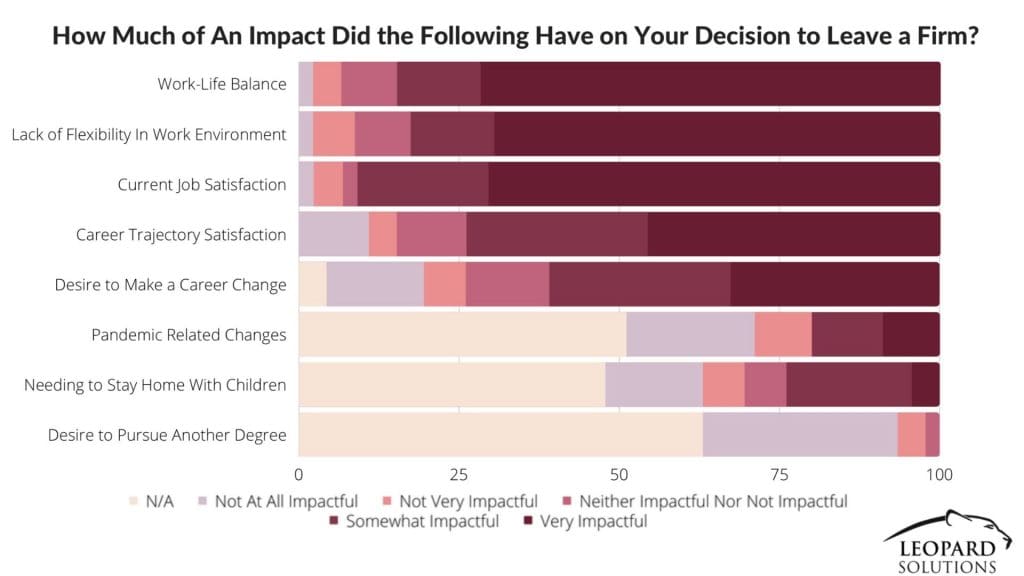Women have been historically under-represented in the legal field. For the last several years, more women are graduating from law school than men, yet only 38% of all lawyers are women and 22% of equity partners are women. The good news is that these numbers have slowly climbed over the last couple of decades and many law firms are actively looking to improve diversity within their partner demographics. While the legal profession is making great strides to change this imbalance, there is still a long way to go. This article dives deeper into the cause of this underrepresentation, how law firms can improve, and what we’re doing to embrace diversity and inclusion in a modern law firm.
The number of women attorneys in the legal profession
The number of women attorneys has steadily increased over time. The first woman attorney, Arabella Mansfield, was admitted to the Iowa bar in 1869. Fast forward 100 years to 1970, and there were now 8,000 women attorneys in the United States. By 1980, this number had increased to 27,000. In 1990, there were 63,000 women attorneys. And as of 2022, there are over 490,000 women attorneys in the United States. As the number of women attorneys grows, so does the awareness around the benefits of diversity and organizations to help support women in law.
Some of these organizations include the National Association for Women Lawyers, The ABA Commission on Women in the Profession, and local state bar chapters dedicated to women in law. These organizations provide resources and networking opportunities for women lawyers. They also work to promote diversity in the legal profession and advocate for issues that are important to women lawyers, especially when it comes to career trajectory and barriers of entry.
The barriers of entry for women attorneys
There are a number of reasons women are reluctant or struggling to progress within the legal field; four of the most common barriers include:
1. Lack of mentors and role models
Women attorneys often lack mentors and role models who can help them navigate the legal profession. This can make it difficult for them to land interviews, learn about different career paths and opportunities, and find relatable people who can help them develop their skills.
2. Gender discrimination
Unfortunately, gender discrimination is still a reality in the legal profession, at times even more so than other comparable professions Women attorneys may face discrimination in hiring, pay, promotions, delegation bias, and other areas. This discrimination can make it difficult for women to advance in their careers, with 74% of women citing career trajectory as a main factor in leaving the practice of law all together. In some cases, law firms start women on different career paths than their male counterparts, assuming they won’t want to take on certain tasks or caseloads. This delegation bias permeates throughout law firm culture as women are given more behind-the-scenes work like contract review instead of being offered complex litigation matters.
3. Work-life balance
The demands associated with traditional law firms and big law can make it difficult for women attorneys to maintain a healthy work-life balance. This can lead to burnout and departure from the legal field as a whole. When this topic of work-life balance comes up, most people assume this means parental responsibilities when it comes to women. However, in a Leopard Solutions survey of women that left their legal jobs in 2021, 70% cited childcare was not a factor while 85% cited lack of work-life balance as a main factor.
Here are some of the insights these women shared when they referred to work-life balance as a main factor for leaving law:
“Instead of living to work, I decided I need a job that allows me to work so I can live the life I want.”
“If law firms want to make themselves more appealing (for women and men … because both are fleeing at record rates), they need to discard the archaic frameworks from which they were built… Most attorneys would happily accept a pay cut if their work was rewarding and less stressful.”
“Female attorneys have to work harder to achieve the same goals and show twice the commitment of their male counterparts. Work-life balance is more difficult to attain for female attorneys because they often have more obligations both inside and outside of work without the same amount of support.”
4. Being taken seriously
Many people still see the legal profession as a man’s world. This is shown when certain clients, colleagues, and judges don’t take women attorneys seriously or look to their male counterparts for final decisions. The aforementioned Leopard Solutions survey also identified 11 steps law firms can take to improve barriers of entry for women in law… #1 on that list is “letting women speak and amplify their voices.” Not being taken seriously or being heard at law firms is a huge reason women leave law.

The benefits of having more women attorneys in the legal profession
Diversity isn’t just a check box for law firms to mark while expanding. Improving diversity of gender, age, race, sexual orientation, education, and more adds new perspectives and ideas to your growing law firm, often resulting in more comprehensive legal services that resonate with other attorneys and potential clients.
Here are five research-based benefits of hiring a more diverse workforce and implementing inclusive business practices:
1. Diverse teams solve problems better.
Having new perspectives and different experiences will give your team an edge when it comes to coming up with a variety of solutions to solve a problem. Diverse teams make better overall decisions 87% of the time compared to individuals.
2. Gender-diverse teams do better.
Yes, teams composed of diverse members financially outperform their non-diverse counterparts by 15%, raising your law firm’s bottom line.
3. Your firm’s reputation will get a boost.
By having more women in leadership roles (department chair or partner level), clients are more likely to see you as a well-rounded law firm and attorneys looking to shift firms are more likely to seek you out. Organizations with inclusive business cultures are actually 58% more likely to improve their reputation.
4. Your team will be more engaged.
If you’re struggling to build that comradery and law firm culture (something we really value at Practus), it could be because your firm lacks diversity. People enjoy learning about experiences different than their own, and the more diverse your team is, the more different experiences and perspectives you’ll get. Millennials are even 83% more likely to engage with a team that’s diverse. Because millennials represent the largest number of people in today’s workforce, this isn’t a statistic you can brush aside.
5. Your firm raises the bar for the legal profession.
Having more women in the legal profession can change the culture of law firms across the world. Most of our attorneys join at the partner level, regardless of gender. Practus’s compensation package is the same for all of our partners (you can see for yourself using our compensation calculator). And, our leadership team is more than 50% women. While we aren’t perfect and definitely have room to improve, we’ve found that a more diverse team leads to a better firm culture and higher standards for other law firms.
Why are women leaving the practice of law?
What we assumed for decades was the reason women are leaving law (children) is actually one of the least important factors for today’s women attorneys. The top three reasons women leave law are: 1) work-life balance, 2) lack of flexibility in work environment, and 3) current job dissatisfaction. This tells us that women want more control over how they practice law.

Women are not alone in feeling the lack of autonomy in traditional law firm culture. In today’s climate, attorneys of all kinds want the autonomy and work-life balance that the legal industry didn’t support in the past. The last few years have opened many people’s eyes to the importance of choosing what they want their daily lives to look like, and for a lot of attorneys, that doesn’t include working into the midnight hours to make those minimum billable hours requirements.
How can law firms improve?
1. Encourage women attorneys to speak up about their experiences and concerns.
2. Make it clear that gender discrimination will not be tolerated.
3. Offer equal opportunities for promotion.
4. Provide training on unconscious bias and its impact on the workplace.
5. Encourage non-minorities to be allies in promoting gender equality (and all forms of equality) in the workplace.
While this list may seem easy enough, law firms are still struggling to address gender issues despite data and the acknowledgement changes need to happen.
The challenges faced by law firms in addressing gender issues.
Despite all the improvements for women in law, firms find it difficult to address these gender inequality issues. You’ve heard, “the first step is admitting you have a problem.” This is true for gender inequality in the legal field. Small improvements are great, but that doesn’t eliminate the big issues women face at attorneys.
The underrepresentation of women in law firms
One of the most significant gender challenges in the legal community is the underrepresentation of women in the profession.
This issue is compounded by the fact that women are often not given the same opportunities as men when it comes to advancement within law firms. This can affect the very culture of the firm itself as well as create a vicious cycle, where women feel discouraged from pursuing careers in law because they don’t see themselves represented at higher levels within the profession.
In order to address these issues, law firms can take active steps to promote gender diversity and inclusion. This includes creating mentorship and sponsorship programs for women, as well as ensuring that women have equal access to leadership positions. By taking these steps, law firms can create a more inclusive environment that will ultimately benefit everyone involved.

The gender pay gap in law firms
The gender pay gap is an ongoing issue in many law firms (and most fields in general in the US). This problem is especially prevalent among high level litigators, appellate attorneys, and big law, where women often earn significantly less than their male counterparts.
There are a number of ways in which law firms can address the gender pay gap issue. One way is by ensuring that all employees are given equal opportunities for career progression, regardless of their gender identity. Another way is by offering more flexible working arrangements so that all attorneys can better balance work and personal life. Firms should also be working towards increasing transparency around pay and bonuses so that women can see how they compare to their male colleagues. Some states are already starting to enact pay transparency laws, and considering we’re all part of the legal industry, we should be the first to adapt to these changes.

Sexual harassment and discrimination against women in law firms
Sexual harassment and discrimination against women are serious problems in many professions, though recent years have shed light on some very troubling scenarios in big law. Although there has been increased awareness and progress, these issues continue to persist in law firms of all sizes, even as solo practitioners.
There are a number of challenges that law firms face in addressing these issues. First, there is often a lack of awareness among firm leadership about the prevalence of sexual harassment and discrimination against women. This can make it difficult to take action to address these problems.
Second, even when firm leaders are aware of the problem, they may be reluctant to take action for fear of damaging the firm’s reputation or losing business. This can make it difficult to implement effective policies and procedures to address sexual harassment and discrimination.
Third, many law firms have a legacy culture inherited from previous generations of attorneys that is hostile to women and minorities. This makes it hard for victims of sexual harassment and discrimination to feel safe coming forward and reporting their experiences. Additionally, this culture can make it difficult for law firms to attract and retain talented women attorneys. If your firm has high turnover among minorities, you should take a hard look at your firm’s culture and perform exit interviews to get insights into why that is.
Finally, many law firms do not have adequate resources devoted to addressing these issues. This can make it difficult to implement effective policies and procedures or to provide training and support for employees.
Despite these challenges, there law firms can take several steps to address sexual harassment and discrimination against women:
- Firm leaders can take steps to be more aware of the problem and committed to taking action.
- Develop policies and procedures that address these issues effectively.
- Provide training for employees on what constitutes sexual harassment and discrimination and how to report it.
- Create a culture that is supportive of women and minorities.
- Allocate adequate resources to addressing these issues, including hiring women in positions such as HR and/or Diversity roles to create a safe space for communication around workplace issues and discrepancies
The Practus Difference: How Practus is taking strides to improve for women in law
Since its founding, Practus has been committed to giving control back to attorneys and welcoming people to our firm of all backgrounds. We believe that a more diverse and inclusive law firm is better for everyone – lawyers, clients, and the public at large.
We address the top reasons women are leaving law head on by always offering flexible work arrangements, promoting work-life balance, and giving our partners the ultimate level of autonomy in their practice. We understand that attorneys are human too and so much more than workhorses pouring out the billable hours, so we work to develop a culture that embraces the unique experiences and backgrounds of each attorney. Our goal is to have a workplace environment that is respectful and supportive of all our employees – regardless of gender or any other characteristic.
As our firm continues to grow, we recognized that we needed more support for these initiatives, and have since hired our wonderful HR Specialist, Holly Einspahr. Holly has brought us strides ahead in documenting such policies and procedures and has helped open our eyes to new opportunities for improvement. This ensures all Practus partners start off on the same page with an equal understanding of what is expected of our team, and creates an environment of safety, transparency and communication.

That being said, we recognize we have room for improvement at our firm as well, which is why taking a leap in diversity and inclusion is a core focus for us this year and next. We’ve begun implementing new policies and procedures designed to empower attorneys and team members, and I think it’s safe to say our attorneys are not shy when it comes to speaking up about changes they want to see implemented.
We know there is still more work to be done in order to achieve true gender equality in the legal profession, and we are committed to continuing our efforts to make Practus a workplace that empowers our attorneys – regardless of gender.






